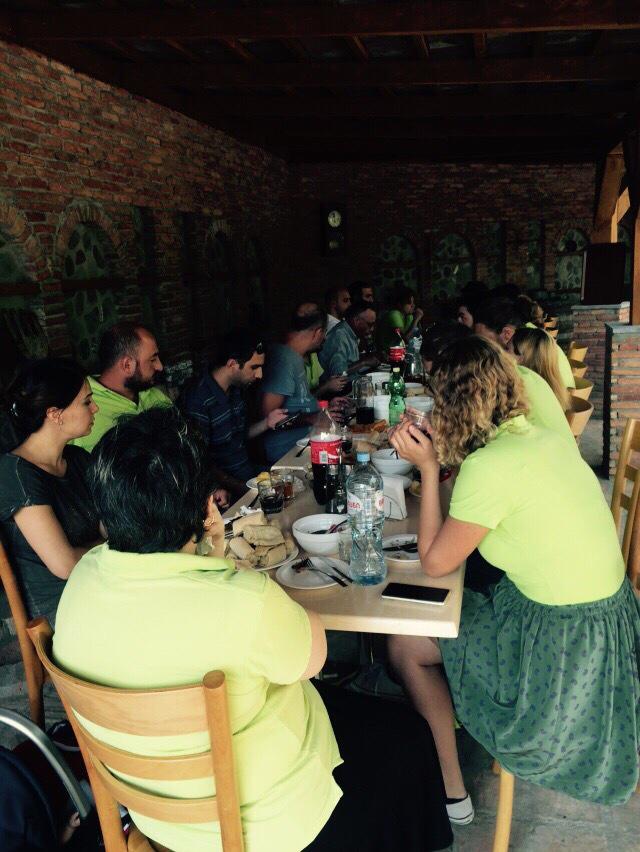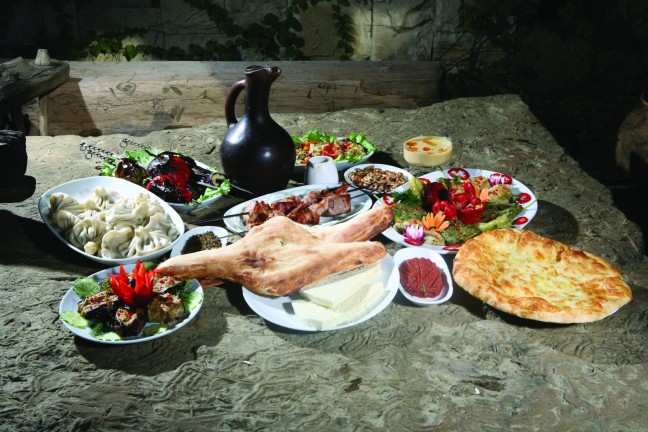Well, let’s get back to writing – shall we? It’s already been some time since i wrote the last time and since I’ve returned from Romania. Therefore, it is wise to put myself into the right writing atmosphere. Suit, coffee, music, a quick skimming through pictures and off we go. If you’re interested in the music:
In between Georgia and now a long time has elapsed in which it appears that I hadn’t had the time to write or travel as I didn’t upload any new stories to this site. This, however, is hardly true. In fact, I have more time than in Georgia. I’ve become slightly lazy and the challenge of competing with the other volunteer’s publishing articles has greatly lessened. In the meantime, my focus has gradually shifted towards reading and adopting styles from writers that can be considered more “important” than my humble self. Fear not! For the writing will continue! Those few that I managed to satisfy with my half-assed, semi-sarcastic and surely completely biased correspondence will get what they’ve been craving for – now.
First of all, I’ll give you a quick overview on the year that separates me from Georgia… expect that it didn’t. For I have already returned there 3 more times since my official departure last March; and I’ve traveled almost all by myself through Balkans by hitchhiking a month after my returning to Luxembourg; and I helped in the task of challenging the recent status quo in politics by protesting against lignite coal in the Lausitz region and by learning the language of the most dreadful of all European and Western countries’ enemy’s language: Russian. Have my studies given me any advantage in communicating with locals while in Romania, Georgia, Armenia, Lithuania, Poland and Eastern Germany? Almost not at all. My Russian remains to this day (quite) bad. I will, however, be working on my language skills.
Let’s get to the actual story, which commenced more than a year ago, back in Georgia where the infamous WTF gang decided to start a major campaign towards Russian territory with the main objective being the magnificent Baikal Lake deep within Siberia. What exactly happened to the fighting spirit of our group I still don’t fathom, but it must be noted that more and more members turned their back on their fellow travellers and chose the routine, the every-day working life and thus backstabbing us. Much that once was, is lost. The initial group diminished in size and morale, and eventually ended up in splintering groups of which one was representative for the whole group on Woodstock and the other in Transylvania – the latter being the heart and soul of the whole movement, including the important elements of hitchhiking, musical skills, random mountain-spotting-and-climbing attitude and minor alcoholism. Sure, some minor deviations have occurred and the changes in character in everyone cannot be unseen.
Good, now that I’m finally done with the 4th introduction, I can start with the telling of the chronological course of events; additionally, I will try to figure out some minor overlapping elements with Georgian mentality and experience that will be analysed in further detail in this article:
Gabi (Ltu) and Paula (Pol) first met somewhere in Romanian mainland after dealing with Wizzair’s incompetence and sudden cancelling of flights, then continued towards Brasov where Sepp and I would join them (actually the name of the city Brasov is written with some kind of nipple, that transforms its pronunciation into something similar [Brashov]. Actually, Romanian happens to be of an extremely interesting structure and history so that one can find elements of all neighbouring regions in it, with the basic structure founding on Latin). And that’s exactly what we did. Luckily, a lot faster than expected as a friendly Romanian guy agreed on taking us all the way from Dresden to Brasov (1400km!!!). Before meeting us he had already driven through most of Germany and had enjoyed something close to 2 hours of sleep. He insisted on driving all by himself. On the way, we had 2 breaks of 4 hours in total which he used to rest. Furthermore, he had some food provisions that consisted of the cheapest bread and meat you can buy in Lidl, which he gladly shared with us. Funnily enough, he laughed at us for falling asleep from time to time. Once we got to Romania, he unloaded his car in his employer’s father’s home where we got some strong homemade wine – a fine welcome into a new culture.
Brasov. Like most cities from former Siebenbürgen it was built by Germans, which also explains its German name of Kronstadt. Beautiful architecture, countless translations into German (however, not necessarily into English), teenage street musicians jamming in the park for their pleasure and two exhausted Gopnik-like travellers finally welcoming their female equivalents in the newly-discovered city – reintroducing Gabi(-ja-chacha-yan) and Paula, the Mysterious Dragonmaster (Վիշապագետ), to the scene. An entire book’s content could hardly suffice to fully portray their personalities, so that I will content myself with the introduction by adding a group picture: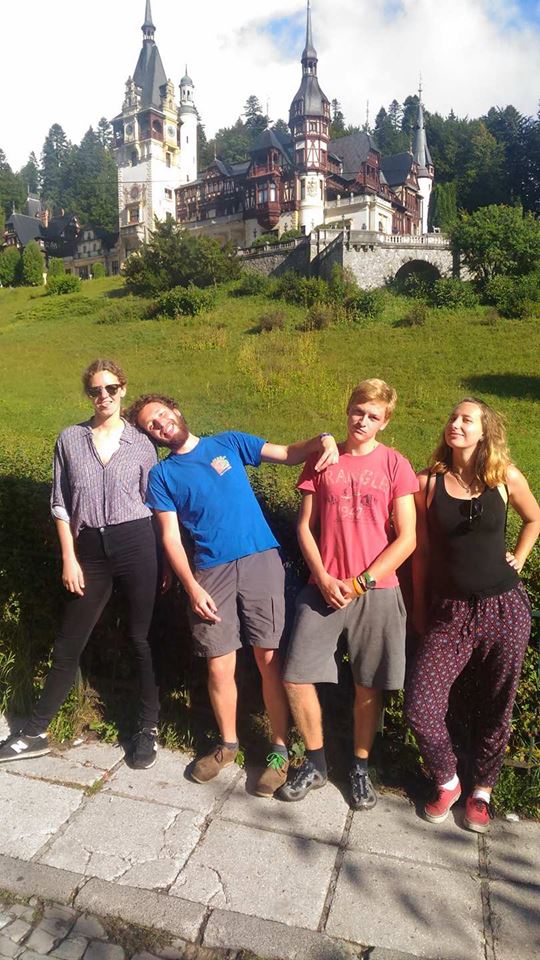
From Brasov, where we explored the huge touristic Hollywood-like sign (also lacking this strange kind of nipple), we continued southwards in the typical style that we had to gradually adapt while in Caucasus: missing the last bus, so that one’s forced to accept a local’s private car that’s easily transformed into an unofficial taxi, thus avoiding taxes and paying less that one would have by taking a bus/marshutka. We eventually escalated a long and winding path leading to the “7-ladder-canyon”/Sapte Scari, where we stayed with the park ranger and her family. Thanks for our predilection for wine, we were able to offer some to the ranger who courteously turned it down, notwithstanding genuine Romanian hospitality by offering us intel on the region (including its bear family that inhabits the mountain range and the lonely fox) grilled potatoes and bread.
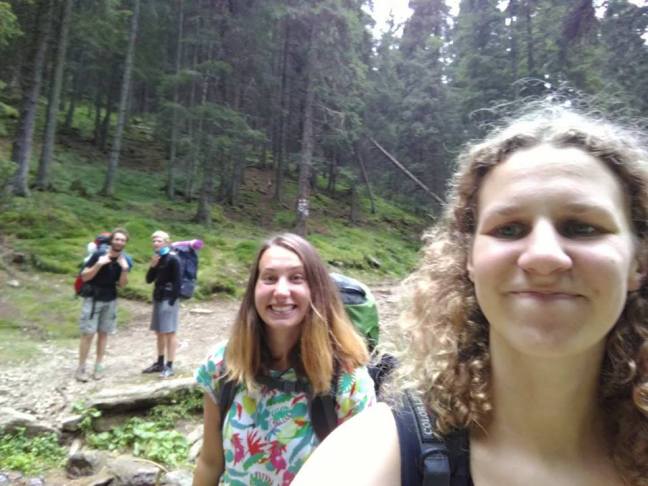
The successive day gave way to heavy rainfall just past afternoon. Before that, our small group was able to skip the payment for the entry to the Ladders, climb through the creek, escape the canyon’s cold, jurassic soul by sliding down a steel rope and playing frisbee for some hours on the shining green meadow just downhill. If we hadn’t taken the bus, we would probably have drowned on the way to Sinaia. Also, we would never had heard the tourist’s information guide, telling us about the dangers of climbing Omul: 2-5m visibility if we’re lucky, 2300 bears in the region, temperatures far below 0° on the summit, at least 27 hours of walk in order to get to Bran on the other side of the national park. Enough to scare us off, aye? Putting our lives at risk for the sake of a view that would be denied – something absolutely ridiculous. For a group like ours, that hasn’t even any material to protect us against heavy rain, neither having adequate shoes for anything that exceeds a stroll on the beach (please note that the shoes that Sepp’s wearing on the picture were the best he had; the same shoes carried him over many summits in the course of the following days while granting him knee ache at the end of our trip), information like this should scare us off like a flock of sheep that sees the shadow of something that barely resembles a wolf.
Here’s a collection of pictures that shows us being reasonable and avoiding such an endeavour:
We didn’t sleep in a tent, but in a mountain rescue hut… mostly because they told us that it’s prohibited to pitch our tent on the premises of the National Park of Bucegi. The possibility of getting caught in a half-frozen state and still having to pay 3-6000Lei was an argument convincing enough to make us pay the reasonable prices of 40Lei per night per person and stay in a (bloody, exceedingly) warm quarter. We were offered some mountain cheese.

Well, what is Romania famous for? Exactly! for its magical garlic that has the power of prevailing against the devilish powers of their national demonic spawn. A mythical construct created by mingling Bram Stoker’s creative spirit, the desolate nature of Romania about 200 years ago and one of Romania’s most infamous personality, the Voivode Vlad III. Draculae or Vlad the Impaler. Time for some historical background! While being a hostage of the Ottoman Empire he soon learned the art of war, only to return to his home country where he claimed the Romanian throne and restored the order in a most brutal way (inviting all gypsies, homeless people and mentally and physically disabled to a feast, then locking them in and burning them alive; all oppositions from the nobility was liquidated in a similar way). When the Ottomans felt menaced by this sheer exhibition of power, they invaded the country. Vlad expected a raid and used the tactic of the Burned Soil After a gruelling, unsuccessful summer campaign of heavy losses against an enemy that used an unsupportable guerrilla technique, they were confronted with a literal forest of spiked corpses. Every single captured Ottoman soldier was put on a thin stick, which made its way through the POW’s guts. Needless to say, the process of dying was performed under an unimaginable amount of pain. Upon seeing this demonstration of pure inhumanity, the morale of the army reached its breaking point and they returned home. Vlad’s brother, however, led another expeditionary force and succeeded in laying siege to Vlad’s fortress: Bran castle (visible in the background).
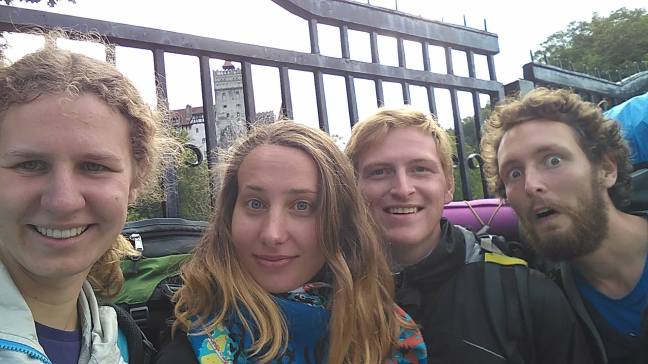
I’d like to put your mind at ease: despite our general lack of garlic we were not visited by a nightly visitor with long and spiky canines. Yet, the only vampires in Romania are working in Bran. Those parasites asked a 35Lei fee – only to be allowed onto the premises of the castle garden! Bloody vampires! So we drank coffee instead and then searched a camping spot. Due to Paula’s great knowledge of the Romanian language, we were able to convince a local worker with a scythe to lead us to an ideal spot, where we enjoyed a refreshing night with another small bottle of wine (Georgia and Romania share a common enthusiasm for big quantities of wine; we purchased a 2nd glass bottle of 1.5l of very acceptable red wine) and grilled food.
Bran –> Sibiu (Hermannstadt). Many thanks to the two cars that helped us: a Canadian-Romanian couple who have a sort of weekend house in Bran, while actually living in Abu Dhabi; a former truck driver, residing in England, who had an excellent taste in music, whose driving skills reminded me of the typical Georgian driver.
After some tasty, nice, slightly salty Balls (Bulz, some traditional food with polenta) and a good night’s sleep we continued towards another peak, namely Cindrel. A lonely Canadian guy gave us a lift, after enjoying a local beer with me. The process of backpacking towards the top was rather spontaneous and quite exhausting. The beer earlier certainly didn’t help. And the weight of the additional wine bottle and cognac were of equal usefulness. We still managed to reach our camping spot, close to another ranger’s hut. Thanks to Sepp’s amazing singing talent no bear dared approach us… it is, however, likely that he was responsible for the Monsoon-like precipitation the upcoming morning. The high-pitched wind and its never-ceasing, cold company didn’t leave us for about 2 hours, until we finally made it to Cindrel’s top (2245m above sea level). It wasn’t until this moment, when the clouds finally lifted and gave way to a superb view on the landscape at our feet that the cognac tasted well. But the few drops that found its way down our throats onto an almost empty stomach as a reward for the arduous hike and tasted like the most exquisite beverage. The drink reminded me of the – usually very mediocre beer – Kaiser that I received after a similarly arduous bicycle tour to Udabno, Kvemo-Kartli, Georgia.
After the highly exhausting, close to 50° inclined descent we arrived on a road. Sadly, we didn’t have cookies… (Thanks, OBAMA) so, instead of writing anything reasonable onto our fellow cardboard sign, Paula figured it being wiser to write “Mag/Shop”. By pure luck, some people actually did stop!
Our last stop as a group in Alba Iulia (also known as Karlsburg, but build around a fortress that was highly inspired by the French architect Vauban) was met with beautiful Langos, a few local beers and a freestyle on the grass dance floor within the outer fortress walls.

The next day, the WTF devotees parted ways – but not for the last time! For our trips are INFINITY! Distances are but a small barrier between us. The only thing that we’ll be missing might be watermelons (“Winter is coming”). Luckily, the next summer will come soon and there will be plenty of Cucurbitaceae and we need not worry. The fellowship will live on. See you, dear readers, next time. Til’ then, let us drink за будущее!
Here’s a short summary of my itinerary:
Berlin->Dresden->Brasov->Sapte Scari->Sinaia->Omul->Bran->Sibiu->Cindrel->Alba Iulia->Cluj-Napoca->Berlin
And some more knowledge that I’ve gathered in Romania:
- it’s acceptable to be racist against Gypsies, because nobody will disagree (at least we haven’t met anyone)
- Russian is useless; I didn’t use it even once
- the country is huge, far more enormous than we had expected… so, always a reason to go back
- everything is German: city names, explanations for tourists, tourists, the entire architecture of many cities
(PS.: I wonder if it makes any difference if you write 0° or -0°C…)



























